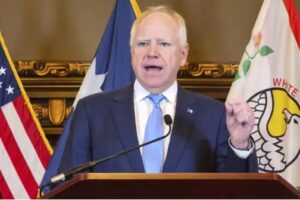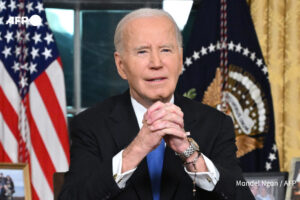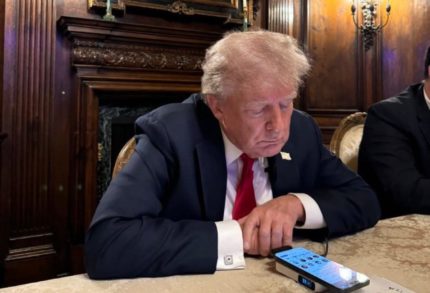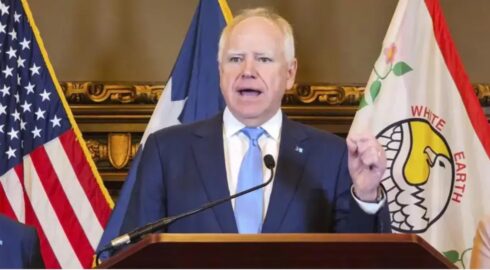Former President Donald Trump has proposed a bold new measure: a “100% tariff” on countries that decide to abandon the US dollar in favor of other currencies. This proposal, according to Donald Trump, is meant to safeguard American economic interests, ensuring that the dollar maintains its prominent position in global markets. Donald Trump’s plan is a reflection of his long-standing focus on “America First” policies, aiming to keep the United States at the center of international economic power.
The introduction of such a tariff would act as a protective measure, aimed at discouraging countries from transitioning to alternative currencies like the Chinese yuan or euro. By imposing this penalty, Donald Trump intends to strengthen the dollar’s position as the world’s primary reserve currency and ensure that the US continues to be a dominant player in global trade.
Targeting Countries Diversifying Currencies
Donald Trump’s proposed tariff directly targets countries that are actively diversifying their currencies and reducing their reliance on the US dollar. This trend, known as de-dollarization, is seen by many as a growing threat to the American economy, potentially diminishing US influence on the world stage. Donald Trump’s move would act as a deterrent, making it economically costly for nations to turn away from the dollar in favor of other currencies.
This proposal comes in response to the increasing number of nations exploring alternatives to the dollar, including Russia and China. By threatening tariffs, Donald Trump hopes to curb this trend and prevent these countries from reducing their economic dependence on the United States, while simultaneously warning others that shifting away from the dollar could have serious financial consequences.
Implications for Global Trade
The global trade landscape could experience significant disruptions should Donald Trump’s tariff proposal be implemented. A tariff of this magnitude on countries abandoning the dollar would inevitably lead to higher import costs for US companies that rely on goods from these nations. Consequently, American consumers may face inflated prices as businesses seek to pass these added costs down the supply chain.
The potential for retaliatory measures from targeted countries is also a concern. Nations affected by such tariffs may introduce their own counter-tariffs or restrictions on US goods, leading to increased tensions and a possible trade war. This, in turn, could disrupt international commerce and global supply chains, complicating trade relations for the US.
Economic Experts Weigh In
Economic analysts are expressing concerns about the potential ramifications of Donald Trump’s proposal, with many questioning the long-term effectiveness of the tariff. While the intent may be to preserve the dollar’s influence, experts caution that imposing such a drastic measure could trigger unintended consequences, such as a global economic slowdown or even a trade war that could harm American businesses.
Some analysts believe that focusing on trade diplomacy or economic incentives would be a more effective strategy than tariffs. These experts suggest that finding collaborative solutions to address de-dollarization may be a better approach than punitive measures, which could backfire and weaken US influence in the global economy.
Deterrent Against De-Dollarization
Donald Trump’s tariff proposal is aimed at halting the accelerating trend of de-dollarization. In recent years, countries like China, Russia, and even some European nations have started exploring alternatives to the dollar for international trade and financial transactions. This movement threatens to chip away at the dollar’s status as the world’s primary reserve currency, which gives the US significant leverage in global economics.
Imposing a 100% tariff could serve as a direct warning to countries that are considering a shift to non-dollar-based financial systems. Donald Trump’s goal is to preserve the centrality of the dollar and, by extension, the United States’ ability to exert influence over global financial markets. This proposal signals the US’s resistance to any moves that might challenge its economic hegemony.
Protectionism vs. Global Cooperation
The debate surrounding Donald Trump’s proposal highlights a broader ideological conflict between protectionist policies and global economic cooperation. Protectionists, like Donald Trump, argue that such measures are necessary to defend national economic interests in an increasingly competitive global marketplace. They believe that tariffs can safeguard domestic industries and prevent the US from being taken advantage of by foreign nations.
On the other hand, advocates of global cooperation stress the importance of free trade and diplomatic solutions to economic challenges. They warn that protectionist policies can lead to trade wars and destabilize global markets, making the world economy more vulnerable. Donald Trump’s latest proposal thus reignites the long-standing debate on whether the US should prioritize economic self-interest or work towards stronger international partnerships.














